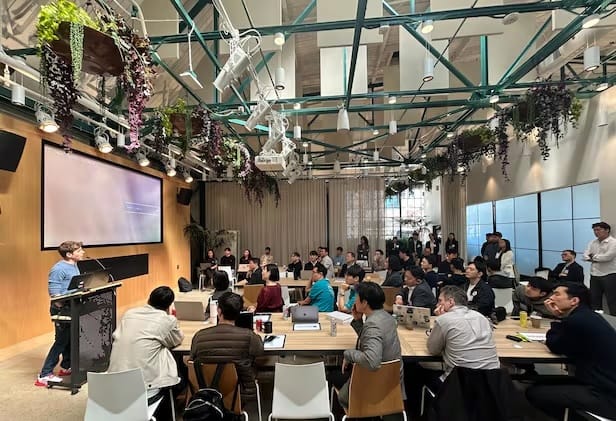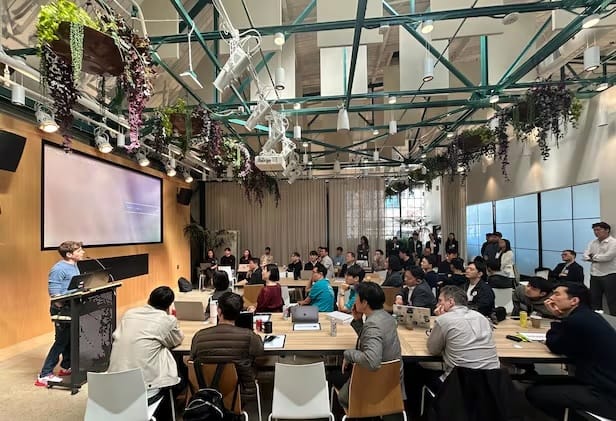Why did OpenAI choose Cliwant as a partner?

On Thursday, March 14, at OpenAI’s headquarters in San Francisco, 14 K-Startups presented in front of four OpenAI judges, the Ministry of SMEs and Startups (MSS), participating companies, and journalists. Each startup transparently shared its vision through a five-minute presentation followed by a two-minute Q&A session. Among them, only three teams—CLIWANT, Marinachain, and Waddle—were selected as final collaboration startups.
I was thrilled, but I never imagined that CLIWANT would receive such significant attention. Within just two days, related articles started pouring in, and inquiries flooded in from journalists, broadcasters, investors, and potential clients. While many congratulated us, the question that most people were curious about was:
"How did CLIWANT, a relatively young and less-known startup, get chosen over other strong competitors?"
I was curious about the answer to that question myself. However, based on my experience at the event and the conversations I had with those present, I have summarized three key reasons.
1. Focus on the Essence
After winning the Most Potential AGI award, a Korean attendee congratulated us, expressing surprise that we had received such a prestigious award despite being a company less than six months old. He also pointed out that OpenAI's judges played a crucial role in our selection. If this competition had been held in Korea, he believed it would have been difficult for a young and relatively unknown startup to be chosen due to industry biases.
So, what did the judges focus on instead of our background? I believe they saw the essence of what we do. Rather than asking technical questions about AI, the judges focused on how we defined the problem of RFP analysis and why AI is well-suited to solve it.
Just days before the presentation, we had initially prepared materials that positioned us as a B2B platform surpassing LinkedIn in an effort to make a grand impression. However, while on the flight to the U.S., we realized that the true problem we aimed to solve was the outdated and inefficient bid industry. The day before our presentation, we went back to the essence of our mission.
💡 The first key factor in our selection was our ability to focus on the essence of the problem we are solving.

2. Concise Presentation
I have never been someone who uses complicated terminology. I admire those who can engage in deep, technical conversations using sophisticated language, but I naturally tend to communicate in simple and clear terms. This applies to both my Korean and English communication. I deliberately use very simple English so that my message is easily understood.
After my presentation, Hyunjong Kim, CEO of WeLaser, mentioned that our presentation was incredibly easy to understand.
During a VC panel talk at Stanford, one common criticism of Korean startups was that their pitch decks contained too much text per slide. Keeping this in mind, we ensured that each slide contained no more than three sentences. Even though we were given five minutes to present, I finished in under four minutes.
The moderator initially limited most teams to only one or two questions from the judges, but CLIWANT was allowed to take three or more due to the clarity and impact of our pitch.
💡 The second key factor in our selection was a presentation that was clear, concise, and easy for anyone to understand.
3. Storytelling
During the celebratory dinner after the event, Jungwook Lim, Director of the Ministry of SMEs and Startups, mentioned that he had expected CLIWANT to win. He observed that OpenAI's judges were nodding in agreement throughout our presentation. While we had practiced thoroughly, in the end, all I did was tell my story.
If a startup’s storytelling doesn’t feel authentic, it can come across as forced. I made an effort to present our journey in a straightforward and honest way.
While our final slide was meant to showcase our vision, I chose not to display it. Instead, I ended with a slide about my team and shared my personal journey.
I have worked in the bid industry for 14 years, yet the industry's inefficiencies remain unresolved. When I discovered GPT, I saw hope. And now, with OpenAI, I truly believe we can solve this problem together. "Thank you."
It wasn’t a dramatic closing statement, but it summarized everything, and the audience responded with a huge round of applause. I could feel that many people resonated with my story.
💡 The third key factor in our selection was authentic storytelling, concluding with a powerful closing statement that encapsulated our message.
Final Thoughts
CLIWANT is still a young company with much to improve. However, during our presentation on March 14, we received high praise for focusing on the essence of the problem, delivering a concise presentation, and telling an authentic story.
At the end of the day, we remain dedicated to solving our customers' problems. While this award and recognition will certainly help spread awareness of our company, our core mission remains unchanged: fixing the inefficiencies in the bid industry. There is still a lot of work to be done.

Join Us in Solving the Bidding Industry’s Challenges
Would you like to be part of this journey? CLIWANT is growing rapidly and is looking for talented individuals in sales, business development, engineering, and design.
If you're interested, contact us at junho@cliwant.com.
Thank you.
Written by Junho, CEO @ CLIWANT
